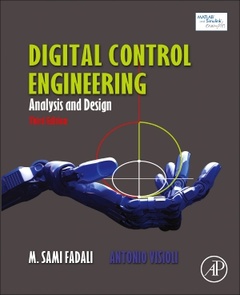Description
Digital Control Engineering (3rd Ed.)
Analysis and Design
Authors: Fadali M. Sami, Visioli Antonio
Language: English
Subjects for Digital Control Engineering:
Keywords
Analog; Antialiasing filters; BIBO stability; Bilinear transformation; Canonical forms; Choice of the sampling period; Controllability; Controller structure; Deadbeat control; Design; Detectability; Difference equations; Differencing methods; Digital control system design; Digital control systems; Digital control; Direct control design; Discrete-time systems; Domain of attraction; Dual-rate control; Equilibrium points; Extended linearization; Feedback control systems; Finite settling time design; Frequency domain design; Frequency response; Hamiltonian system; Input–output stability; Internal stability; Jury test; Leverrier algorithm; Linear quadratic regulator; Linearization; Lyapunov stability theory; Model predictive control; Modeling; Nonlinear controller design; Nonlinear systems; Nyquist criterion; Observability; Observer; Optimal; Phase and gain margin; Pole placement; Pole-zero matching; Practical implementation of; Prewarping; Properties of state–space models; Quantization errors; Realization; Sampling frequency; Sampling theorem; S-domain roots locus; Sensitivity; Separation theorem; Servo problem; Similarity transformation; Stability of analog systems with digital control; Stability; Stabilizability; State estimation; State–space modeling; State; Steady-state error; Sylvester"s expansion; Time delay; Transfer functions; Z-domain roots locus; Zero-order hold; Ziegler-Nichols methods; z-transform
122.46 €
In Print (Delivery period: 14 days).
Add to cart700 p. · 19x23.4 cm · Paperback
Description
/li>Contents
/li>Readership
/li>Biography
/li>Comment
/li>
Digital controllers are part of nearly all modern personal, industrial, and transportation systems. Every senior or graduate student of electrical, chemical, or mechanical engineering should therefore be familiar with the basic theory of digital controllers. This new text covers the fundamental principles and applications of digital control engineering, with emphasis on engineering design. Fadali and Visioli cover analysis and design of digitally controlled systems and describe applications of digital control in a wide range of fields. With worked examples and Matlab applications in every chapter and many end-of-chapter assignments, this text provides both theory and practice for those coming to digital control engineering for the first time, whether as a student or practicing engineer.
1. Introduction to Digital Control 2. Discrete-Time Systems 3. Modeling of Digital Control Systems 4. Stability of Digital Control Systems 5. Analog Control System Design 6. Digital Control System Design 7. State–Space Representation 8. Properties of State–Space Models 9. State Feedback Control 10. Optimal Control 11. Elements of Nonlinear Digital Control Systems 12. Practical Issues
APPENDIX I: Table of Laplace and z-Transforms II: Properties of the z-Transform III: Review of Linear Algebra
Undergraduate and graduate students in digital controls. Control engineers
M. Sami Fadali earned a BS in Electrical Engineering from Cairo University in 1974, an MS from the Control Systems Center, UMIST, England, in 1977 and a Ph. D. from the University of Wyoming in 1980. He was an Assistant Professor of Electrical Engineering at the University of King Abdul Aziz in Jeddah , Saudi Arabia 1981-1983. From 1983-85, he was a Post Doctoral Fellow at Colorado State University. In 1985, he joined the Electrical Engineering Dept. at the University of Nevada, Reno, where he is currently Professor of Electrical Engineering. In 1994 he was a visiting professor at Oakland University and GM Research and Development Labs. He spent the summer of 2000 as a Senior Engineer at TRW, San Bernardino. His research interests are in the areas of fuzzy logic stability and control, state estimation and fault detection, and applications to power systems, renewable energy, and physiological systems
Full Professor in Control Systems at the Department of Mechanical and Industrial Engineering of the University of Brescia, Brescia, Italy
He received the Laurea degree in Electronic Engineering from the University of Parma in 1995. From September 1994 to February 1995 he was an ERASMUS student at the Electrical and Electronic Department of the Loughborough University of Technology (now Loughborough University), UK. From September 1995 to November 2012 he was with the Department of Information Engineering (formerly, Department of Electronics for Automation) of the Faculty of Engineering of the University of Brescia . In 1999 he received the Ph.D. degree in Applied Mechanics from the University of Brescia.
He is a senior member of IEEE, a member of the IFAC Technical Commitee on Education, a member of the Technical Committee on Education of the IEEE Control Systems Society, a member of the subcommittees on Event-Based Control &
- This new edition covers new topics such as Model Predictive Control and Linear Matrix Inequalities.
- To engage students, it has more illustrations and simple examples; the mathematical notation is reduced where possible, and it also includes intermediate mathematical steps in derivations.
- Companion website features resources for instructors, including Powerpoint slides and solutions.
- Extensive use of CAD Packages: Matlab and Simulink sections at the end of each chapter show how to implement concepts from the chapter.
- Contains review material to aid understanding of digital control analysis and design.
- Includes some advanced material to make it suitable for an introductory graduate level class or for two quarters at the senior/graduate level.
- The mathematics background required for understanding most of the book is based on what can be reasonably expected from the average electrical, chemical, or mechanical engineering senior.




